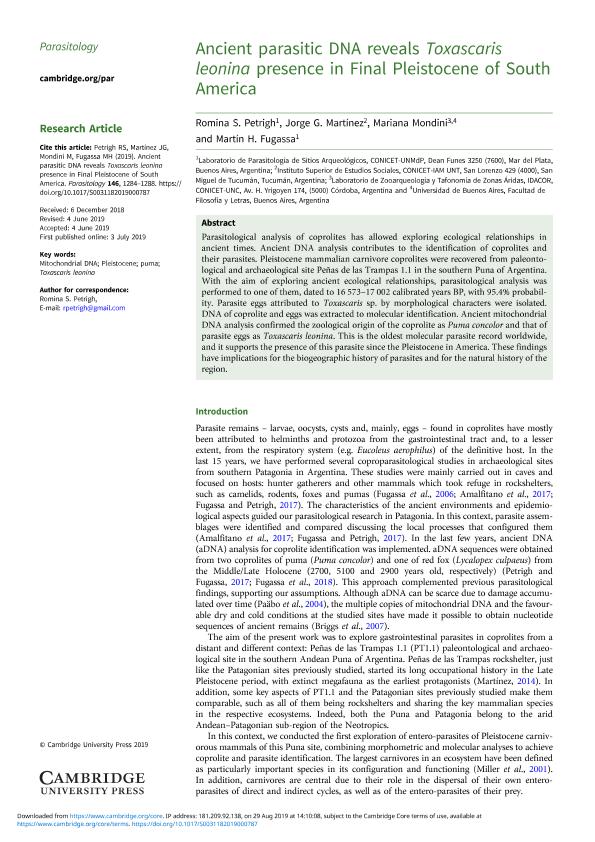Mostrar el registro sencillo del ítem
dc.contributor.author
Petrigh, Romina Sandra

dc.contributor.author
Martinez, Jorge Gabriel

dc.contributor.author
Mondini, Nora Mariana

dc.contributor.author
Fugassa, Martín Horacio

dc.date.available
2022-11-15T17:57:37Z
dc.date.issued
2019-05
dc.identifier.citation
Petrigh, Romina Sandra; Martinez, Jorge Gabriel; Mondini, Nora Mariana; Fugassa, Martín Horacio; Ancient DNA record from Final Pleistocene reveals Toxascaris leonina in Final Pleistocene of South America; Cambridge University Press; Parasitology; 146; 10; 5-2019; 1284-1288
dc.identifier.issn
0031-1820
dc.identifier.uri
http://hdl.handle.net/11336/177873
dc.description.abstract
Parasitological analysis of coprolites has allowed exploring ecological relationships in ancient times. Ancient DNA analysis contributes to the identification of coprolites and their parasites. Pleistocene mammalian carnivore coprolites were recovered from paleontological and archaeological site Peñas de las Trampas 1.1 in the southern Puna of Argentina. With the aim of exploring ancient ecological relationships, parasitological analysis was performed to one of them, dated to 16 573-17 002 calibrated years BP, with 95.4% probability. Parasite eggs attributed to Toxascaris sp. by morphological characters were isolated. DNA of coprolite and eggs was extracted to molecular identification. Ancient mitochondrial DNA analysis confirmed the zoological origin of the coprolite as Puma concolor and that of parasite eggs as Toxascaris leonina. This is the oldest molecular parasite record worldwide, and it supports the presence of this parasite since the Pleistocene in America. These findings have implications for the biogeographic history of parasites and for the natural history of the region.
dc.format
application/pdf
dc.language.iso
eng
dc.publisher
Cambridge University Press

dc.rights
info:eu-repo/semantics/openAccess
dc.rights.uri
https://creativecommons.org/licenses/by-nc-sa/2.5/ar/
dc.subject
MITOCHONDRIAL DNA
dc.subject
PLEISTOCENE
dc.subject
PUMA
dc.subject
TOXASCARIS LEONINA
dc.subject.classification
Otros Tópicos Biológicos

dc.subject.classification
Ciencias Biológicas

dc.subject.classification
CIENCIAS NATURALES Y EXACTAS

dc.title
Ancient DNA record from Final Pleistocene reveals Toxascaris leonina in Final Pleistocene of South America
dc.type
info:eu-repo/semantics/article
dc.type
info:ar-repo/semantics/artículo
dc.type
info:eu-repo/semantics/publishedVersion
dc.date.updated
2022-11-15T14:17:54Z
dc.journal.volume
146
dc.journal.number
10
dc.journal.pagination
1284-1288
dc.journal.pais
Reino Unido

dc.journal.ciudad
Cambridge
dc.description.fil
Fil: Petrigh, Romina Sandra. Consejo Nacional de Investigaciones Científicas y Técnicas. Centro Científico Tecnológico Conicet - Mar del Plata; Argentina
dc.description.fil
Fil: Martinez, Jorge Gabriel. Consejo Nacional de Investigaciones Científicas y Técnicas. Centro Científico Tecnológico Conicet - Tucumán. Instituto Superior de Estudios Sociales. Universidad Nacional de Tucumán. Instituto Superior de Estudios Sociales; Argentina
dc.description.fil
Fil: Mondini, Nora Mariana. Consejo Nacional de Investigaciones Científicas y Técnicas. Centro Científico Tecnológico Conicet - Córdoba. Instituto de Antropología de Córdoba. Universidad Nacional de Córdoba. Facultad de Filosofía y Humanidades. Instituto de Antropología de Córdoba; Argentina
dc.description.fil
Fil: Fugassa, Martín Horacio. Consejo Nacional de Investigaciones Científicas y Técnicas. Centro Científico Tecnológico Conicet - Mar del Plata; Argentina
dc.journal.title
Parasitology

dc.relation.alternativeid
info:eu-repo/semantics/altIdentifier/url/https://www.cambridge.org/core/journals/parasitology/article/ancient-parasitic-dna-reveals-toxascaris-leonina-presence-in-final-pleistocene-of-south-america/9E406417164E40114F819AA78D60C667
dc.relation.alternativeid
info:eu-repo/semantics/altIdentifier/doi/http://dx.doi.org/10.1017/S0031182019000787
Archivos asociados
